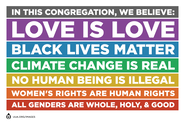The stories we tell matter. The ones we tell about ourselves, this congregation, its history, and our yearnings and visions for its future.
I've been reflecting on the stories I am discovering and hearing at Fourth UU as I read The Power of Stories: A Guide for Leading Multi-Racial and Multi-Cultural Congregations, by Rev. Jacqueline Lewis of Middle Collegiate Church. The author shares stories of ministers successfully leading radically inclusive congregations and lifts up the importance of storytelling in creating a unified community that embraces the multiple, complex stories within the whole.
Although the book is focused on larger congregational identity and leadership issues, I find my mind wandering to the importance of storytelling and the stories we tell our children. These stories, and the storytellers, have the power to shape our children's lives and our future.
We know stories told to children convey values, beliefs, attitudes and social norms, shape their perceptions of reality and influence their understanding of cultural and gender roles. Characters and dilemmas in stories help our children learn how to develop empathy and cultivate creative thinking about possibilities, ideas and solutions. Research is full of studies that show how stories have been used to build children's intercultural perspectives and influence how they choose to act in the world and engage in social action.
When we include storytelling and stories in our Sunday services, we have the opportunity to convey and amplify our liberal religious values, such as honoring the inherent worth and dignity of every person. We can counter negative narratives our children may be exposed to in the world at large and reinforce our UU principles and mission of Fourth UU.
We have the opportunity to paint a rich and varied picture of the world, one which recognizes and illustrates a range of individual experiences, and confirms the beauty found in diversity.
We have the opportunity to become storytellers -- of others' stories or our own. Our storytelling doesn't need to be perfect to be effective. A good story, a parable, or the tale of a quandary often carries itself.
Are you a storyteller? A Moth Radio Hour wannabe? Wouldn't you love to find a time and place that welcomes and honors this part of your being ... as yourself or your stage persona? Tell me about it, please, because I would love to welcome you to a storytellers' group that helps plan and participate in our Sunday services.
Remember, it's not just the children who benefit from storytelling and stories and mull them over throughout the days that follow!
With blessings for the journey,
Rev. Cindy
I've been reflecting on the stories I am discovering and hearing at Fourth UU as I read The Power of Stories: A Guide for Leading Multi-Racial and Multi-Cultural Congregations, by Rev. Jacqueline Lewis of Middle Collegiate Church. The author shares stories of ministers successfully leading radically inclusive congregations and lifts up the importance of storytelling in creating a unified community that embraces the multiple, complex stories within the whole.
Although the book is focused on larger congregational identity and leadership issues, I find my mind wandering to the importance of storytelling and the stories we tell our children. These stories, and the storytellers, have the power to shape our children's lives and our future.
We know stories told to children convey values, beliefs, attitudes and social norms, shape their perceptions of reality and influence their understanding of cultural and gender roles. Characters and dilemmas in stories help our children learn how to develop empathy and cultivate creative thinking about possibilities, ideas and solutions. Research is full of studies that show how stories have been used to build children's intercultural perspectives and influence how they choose to act in the world and engage in social action.
When we include storytelling and stories in our Sunday services, we have the opportunity to convey and amplify our liberal religious values, such as honoring the inherent worth and dignity of every person. We can counter negative narratives our children may be exposed to in the world at large and reinforce our UU principles and mission of Fourth UU.
We have the opportunity to paint a rich and varied picture of the world, one which recognizes and illustrates a range of individual experiences, and confirms the beauty found in diversity.
We have the opportunity to become storytellers -- of others' stories or our own. Our storytelling doesn't need to be perfect to be effective. A good story, a parable, or the tale of a quandary often carries itself.
Are you a storyteller? A Moth Radio Hour wannabe? Wouldn't you love to find a time and place that welcomes and honors this part of your being ... as yourself or your stage persona? Tell me about it, please, because I would love to welcome you to a storytellers' group that helps plan and participate in our Sunday services.
Remember, it's not just the children who benefit from storytelling and stories and mull them over throughout the days that follow!
With blessings for the journey,
Rev. Cindy

 RSS Feed
RSS Feed


